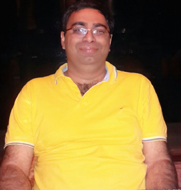Hand
It starts with an accident –
a careless kitchen knife slices open
a palm, and as he yells and curses
and waits for the nanobots
to do their healing work,
his head lifts briefly out of
the sea of grief, then the wound closes
and he remembers – Junaid is gone.
But the healed hand is no longer
his, now it’s larger, scarred and
thicker fingered – almost like Junaid’s.
It’s late, and fixing the badly healed hand
becomes just another postponed chore.
In bed, as he lies sleepless on his back,
the hand moves on its own,
strokes the opposite shoulder,
ruffles his hair and, in a familiar
motion, runs knuckles across
his cheek and a single finger
along his lips, toys playfully
at the sparse hair on his chest.
But as a finger on the strange hand
rounds a nipple, he stops himself,
held back by an all-too-familiar guilt.
His body does not belong to
anyone any more, not even to himself.
But the hand responds neither to
words not strength, but moves down
to stroke him to the release
he’s denied himself since Junaid’s death,
and cradles his head while he sleeps.
The next morning the nanobots
have cleared up their mistake –
both hands are his, and exactly
the same, and the day is wearying
as the previous one. Night falls and he
cannot resist the foolish urge
towards repetition – he gashes open the same
palm, and waits, hoping and hating himself.
Junaid’s hand is back, complete
with scars and unkempt fingernails.
This night he doesn’t hold back
the hand from touching every aching
part of him, and in the late hours
he’s able, after a long time,
to laugh at himself, as he
holds hands with himself
till the morning light.
The third night, after he’s washed off
the day’s accumulation of pity and self-reproach,
he picks up the knife again.
But instead of just a hand,
he longs to see his beloved’s face
again, and the blade slashes open
his left cheek, squirting blood
all over the bedroom mirror.
It takes a minute for him
to realize the nanobots have failed
this time – the blood won’t stop.
He’s tempted to let it go on
and ignore the panic button, and
he’s not sure whose finger finally
calls for the help that saves him.
All through counselling and against seven doctors,
he defends the scar across his cheek,
tells them it reminds him not to go
there again. In a few months,
when it no longer burns or glows
back at him in a reflection,
he might even learn to let someone
trace their finger along its path.
 Rohinton Daruwala lives and works in Pune, India. He writes code for a living, and speculative fiction and poetry in his spare time. He tweets as @wordbandar and blogs at: wordbandar.wordpress.com/. His first collection of poems is titled The Sand Libraries of Timbuktu (Speaking Tiger 2016). His work has previously appeared in Strange Horizons, New Myths, Star*Line, and Silver Blade.
Rohinton Daruwala lives and works in Pune, India. He writes code for a living, and speculative fiction and poetry in his spare time. He tweets as @wordbandar and blogs at: wordbandar.wordpress.com/. His first collection of poems is titled The Sand Libraries of Timbuktu (Speaking Tiger 2016). His work has previously appeared in Strange Horizons, New Myths, Star*Line, and Silver Blade.

